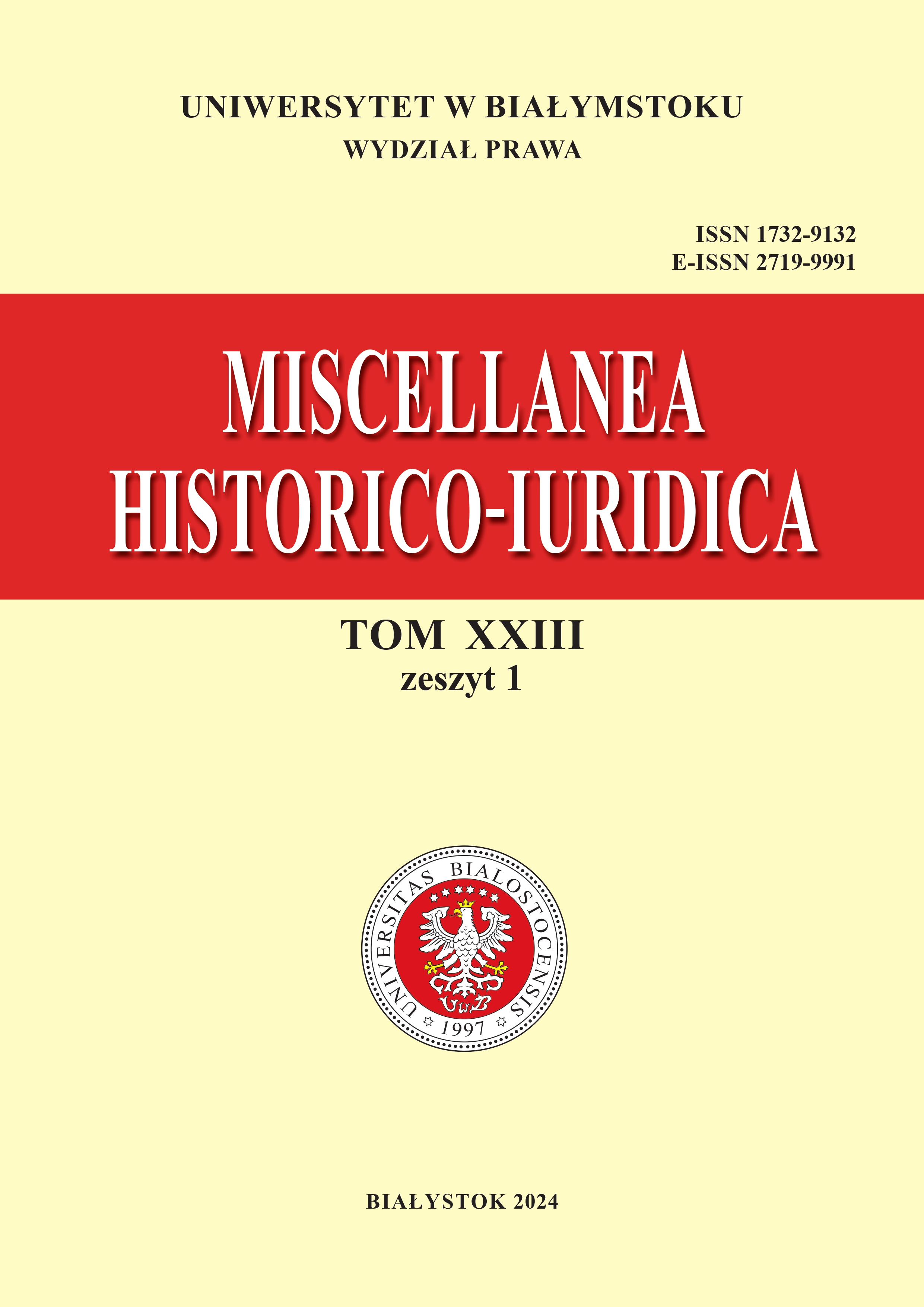In the Majesty of the Law? Jewish Residents of Warsaw in the Face of German Occupation Ordinances and Activities of Sondergericht Warschau – Part I
Keywords:
Jews, Holocaust, occupation, law, special courtAbstract
The article focuses on the attitude of the Warsaw’s Jewish population toward selected, most significant anti-Jewish laws passed in the General Government during World War II. Due to the breadth of the analyzed material, the text is divided into two main parts. The first part presents the Ordinance on forced labor for the Jewish people of October 26, 1939, and the Ordinance prohibiting ritual slaughter of October 26, 1939. The objective of the different ordinances was to regulate the lives of Jews under occupation. The first ordinance led to the exploitation of, and the second led to discrimination against, Jews. The authors discuss their content, reception among Jews, and the practice of application by the German Special Court in Warsaw (Sondergericht Warschau). Indeed, the German Special Court in Warsaw considered cases involving violations of individual ordinances in the Warsaw District. To prepare the author analyzed literature on the subject, including memoirs, press articles, as well as archival sources of judicial provenance. Historical and formal-dogmatic methods were used during the research. The article looks at not only the reception of the anti-Jewish laws themselves by the population they targeted. Not only the trials and the enforcement of the imposed sentences were of particular interest to the authors, but also the strategies pursued by Warsaw’s Jews to better cope with the new legislation that came into force under the German occupation. The research made it possible to show German legislative policy in the context of actions aimed at the exploitation, discrimination, stigmatization, and isolation of Jews.
References
National Archives in Warsaw, Special Court in Warsaw.
United States Holocaust Memorial Museum Archives, Criminal Prison in Warsaw – Mokotów District.
Archiwum Ringelbluma. Konspiracyjne Archiwum Getta Warszawy, Volksdeutsche, Vol. 32, compiled by A. Ciałowicz, Warsaw 2017.
Archiwum Ringelbluma. Konspiracyjne Archiwum Getta Warszawy. Dzienniki z getta warszawskiego, vol. 23, compiled by K. Person, Z. Trębacz, M. Trębacz, Warsaw 2015.
Archiwum Ringelbluma. Konspiracyjne Archiwum Getta Warszawy. Prasa getta warszawskiego: Bund i Cukunft, vol. 16, compiled by M. Rusinek-Karwat, A. Jarkowska-Natkaniec, Warsaw 2016.
Journal of Ordinances of the General Governor for the occupied Polish areas 1939.
Pospieszalski K.M., Hitlerowskie „prawo” okupacyjne w Polsce. Część II: Generalna Gubernia. Wybór dokumentów i próba syntezy, Documenta Occupationis, vol. VI, Poznań 1958.
Reichsgesetzblatt (RGBl.) 1939.
Weh A., Das Recht des Generalgouvernements, Krakow 1940.
Adama Czerniakowa dziennik getta warszawskiego 6 IX 1939 – 23 VII 1942, compiled by M. Fuks, Warsaw 1983.
Erlich Bronisław, Żydowskie dziecko Warszawy. Wspomnienia czasu zagłady, edited by P. Wieczorek, Warsaw 2021.
Hosenfeld Wilm, Staram się ratować każdego”. Życie niemieckiego oficera w listach i dziennikach, transl. by J. Tycner, W. Tycner, M. Tycner, P. Tycner, A. Tycner, editors E.C. Król, W. Lipscher, Warsaw 2007.
Kapłan Chaim Aron, Dziennik 1939. Megila życia, translated and compiled by B. Górecka, Warsaw 2019.
Perechodnik Calek, Czy ja jestem mordercą?, compiled by P. Szapiro, Warsaw 1995.
Ringelblum Emanuel, Kronika getta warszawskiego wrzesień 1939 – styczeń 1943, introduction and compiled by A. Eisenbach, transl. by A. Rutkowski, Warsaw 1983.
Szpilman Władysław, Pianista. Warszawskie wspomnienia 1939–1945, introduction and compiled by A. Szpilman, Krakow 2001.
Blumenthal N., Rząd w tzw. Generalnej Guberni a rozwiązanie kwestii żydowskiej, [in:] Ekspertyzy i orzeczenia przed Najwyższym Trybunałem Narodowym, vol. VIII, selected and prepared for publication by C. Pilichowski, Warsaw 1981.
Eisenbach Artur, Hitlerowska polityka zagłady Żydów, Warsaw 1961.
Engelking Barbara, Leociak Jacek, Getto warszawskie. Przewodnik po nieistniejącym mieście, 2nd ed., Warsaw 2013.
Graczyk Konrad, Sondergericht Kattowitz. Sąd Specjalny w Katowicach 1939-1945, Warsaw 2020.
Sakowska Ruta, Ludzie z dzielnicy zamkniętej. Z dziejów Żydów w Warszawie w latach okupacji hitlerowskiej, październik 1939 – marzec 1943, Warsaw 1993.
Weckbecker Gerd, Zwischen Freispruch und Todesstrafe. Die Rechtsprechung der nationalsozialistischen Sondergerichte Frankfurt/Main und Bromberg, Baden-Baden 1998.
Żyndul Jolanta, Zajścia antyżydowskie w Polsce w latach 1935–1937, Warsaw 1994.
Biuletyn ŻIH, 1970, no. 73.
The Pianist, dir. by R. Polański, France-Poland-Great Britain-Germany 2002.
Downloads
Published
Issue
Section
License
Copyright (c) 2024 Miscellanea Historico-Iuridica

This work is licensed under a Creative Commons Attribution-ShareAlike 4.0 International License.







